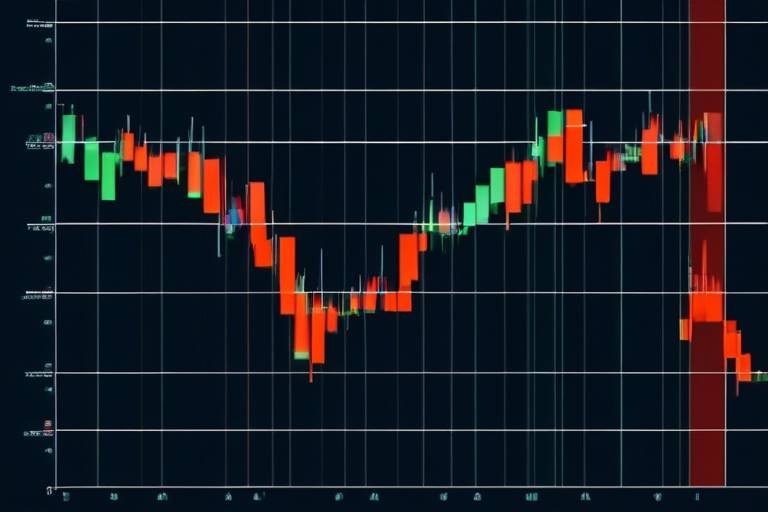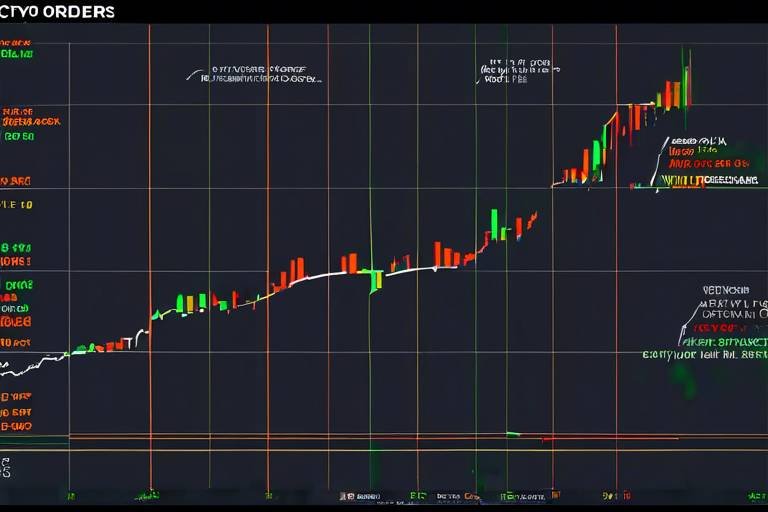The Role of ETFs in Crypto Trading
In recent years, the cryptocurrency market has exploded in popularity, attracting a diverse range of investors from all walks of life. As this digital frontier evolves, so too does the landscape of investment vehicles available to traders. One of the most significant developments in this space is the emergence of Exchange-Traded Funds (ETFs) tailored specifically for cryptocurrencies. But what exactly does this mean for the average investor? How do these ETFs play a crucial role in shaping the dynamics of crypto trading? Buckle up, because we're about to dive deep into the world of crypto ETFs and uncover their importance in today's market.
To start, let's break down what crypto ETFs are. These funds are designed to track the performance of various cryptocurrencies, allowing investors to gain exposure to digital assets without the need to buy them outright. Imagine walking into a candy store and being able to enjoy a mixed bag of your favorite sweets without having to choose just one. That's essentially what crypto ETFs offer—they simplify the investment process and enhance accessibility for both seasoned investors and newcomers alike.
One of the standout features of crypto ETFs is their ability to provide diversification. Instead of putting all your eggs in one basket by investing in a single cryptocurrency, ETFs allow you to spread your investment across multiple assets. This can significantly reduce your risk, especially in a market as volatile as crypto. Think of it like a well-balanced diet; just as you wouldn't want to eat only one type of food, diversifying your investments helps ensure a healthier financial portfolio.
Moreover, the liquidity of crypto ETFs is a game-changer. They enable easier buying and selling of digital assets, which contributes to a more stable and efficient market environment. When more people can easily trade cryptocurrencies, it leads to increased trading volumes and, ultimately, better price discovery. It's akin to opening the floodgates; the more participants there are in the market, the smoother the trading process becomes.
But what about the risks? It's essential to remember that while crypto ETFs can help manage exposure to market volatility, they are not devoid of risks. The trading activity of these funds can influence the price movements of the underlying cryptocurrencies. Therefore, understanding this relationship is vital for investors looking to navigate the often-turbulent waters of the crypto landscape effectively.
As we look to the future, the role of crypto ETFs is likely to expand even further. We may see increased product offerings and enhanced regulatory frameworks that provide greater security for investors. With institutional participation on the rise, the landscape of crypto ETFs could become more robust, offering exciting opportunities for savvy investors willing to engage with this dynamic market.
- What are the main advantages of investing in crypto ETFs? Crypto ETFs provide diversification, liquidity, and ease of trading, making them an attractive option for both new and experienced investors.
- Are crypto ETFs safe? While crypto ETFs are subject to regulatory compliance, they still carry risks associated with the volatility of the cryptocurrency market.
- How do crypto ETFs affect market liquidity? By facilitating easier buying and selling of digital assets, crypto ETFs contribute to increased trading volumes and a more stable market environment.
- What trends can we expect in the future of crypto ETFs? Future trends may include increased product offerings, enhanced regulatory frameworks, and greater institutional participation.

What Are Crypto ETFs?
This article explores the significance of Exchange-Traded Funds (ETFs) in the cryptocurrency market, examining their impact on trading, investment strategies, and overall market dynamics.
Crypto ETFs, or Exchange-Traded Funds, are innovative investment vehicles designed to track the performance of various cryptocurrencies. Imagine wanting to invest in a basket of fruits; instead of buying each fruit separately, you can simply purchase a fruit basket. Similarly, crypto ETFs allow investors to gain exposure to a variety of digital assets without the need to directly own them. This approach simplifies the investment process and enhances accessibility for a broader audience.
By pooling funds from multiple investors, crypto ETFs acquire a diversified portfolio of cryptocurrencies. This can include well-known coins like Bitcoin and Ethereum, as well as lesser-known altcoins. The beauty of ETFs lies in their ability to offer a way for investors to participate in the crypto market without the complexities of buying and storing individual assets. Instead of worrying about wallets, private keys, and security measures, investors can simply buy shares of the ETF through a brokerage account, just like they would with traditional stocks.
Additionally, crypto ETFs are traded on traditional stock exchanges, which means they can be bought and sold throughout the trading day at market prices. This liquidity is a significant advantage, as it allows investors to react quickly to market changes. Furthermore, many crypto ETFs are designed to track specific indices, which can help investors understand market trends and make informed decisions.
To summarize, here are some key characteristics of crypto ETFs:
- Accessibility: They lower the barriers to entry for retail investors.
- Diversification: They provide exposure to a range of cryptocurrencies.
- Liquidity: They can be traded on stock exchanges throughout the day.
- Simplicity: They eliminate the need for managing individual cryptocurrency assets.
In essence, crypto ETFs represent a bridge between traditional finance and the burgeoning world of digital currencies, making it easier for investors to navigate this exciting yet complex landscape.
Investing in crypto ETFs offers several advantages, including diversification, liquidity, and ease of trading. These benefits make them an attractive option for both novice and experienced investors looking to enter the crypto market.
Crypto ETFs lower the barriers to entry for retail investors, allowing them to participate in the cryptocurrency market without requiring extensive knowledge or technical expertise about blockchain technology.
Many crypto ETFs are subject to regulatory oversight, providing a layer of security for investors. This compliance can help mitigate risks associated with investing in cryptocurrencies, which are often volatile and less regulated.
Crypto ETFs can offer tax advantages compared to direct cryptocurrency investments. Investors may benefit from capital gains treatment and simplified tax reporting, making them a more efficient investment vehicle.
Investing in crypto ETFs can help manage exposure to market volatility. By spreading investments across multiple cryptocurrencies, ETFs can mitigate the risks associated with individual asset price fluctuations.
Crypto ETFs play a crucial role in enhancing market liquidity. They facilitate easier buying and selling of digital assets, contributing to a more stable and efficient cryptocurrency market environment.
The introduction of crypto ETFs has led to increased trading volumes in the cryptocurrency market, as they attract institutional and retail investors, ultimately contributing to price discovery and market efficiency.
The trading activity of crypto ETFs can significantly influence the price movements of underlying cryptocurrencies. Understanding this relationship is essential for investors looking to navigate the crypto landscape effectively.
As the cryptocurrency market continues to evolve, so too will the landscape of crypto ETFs. Emerging trends may include increased product offerings, enhanced regulatory frameworks, and greater institutional participation in the market.
Q: What is the primary advantage of investing in a crypto ETF compared to directly buying cryptocurrencies?
A: The primary advantage is that crypto ETFs offer diversification and ease of trading without the need to manage individual assets, making them more accessible for many investors.
Q: Are crypto ETFs regulated?
A: Yes, many crypto ETFs are subject to regulatory oversight, which helps provide a layer of security for investors and can mitigate some of the risks associated with investing in cryptocurrencies.
Q: Can I trade crypto ETFs like regular stocks?
A: Absolutely! Crypto ETFs are traded on traditional stock exchanges, allowing you to buy and sell them throughout the trading day at market prices, just like regular stocks.

Benefits of Investing in Crypto ETFs
Investing in crypto ETFs brings a multitude of advantages that can significantly enhance your trading experience. One of the most compelling benefits is diversification. By investing in a single ETF, you can gain exposure to a basket of cryptocurrencies, which helps spread the risk. This is akin to not putting all your eggs in one basket; if one cryptocurrency performs poorly, others may perform well, balancing your overall investment.
Another key advantage is liquidity. Crypto ETFs are traded on major exchanges just like stocks, meaning you can buy or sell them at any time during market hours. This ease of trading allows investors to react quickly to market changes, enhancing their ability to capitalize on price movements. Imagine being able to jump into a hot crypto trend without the hassle of setting up a digital wallet or navigating complex exchanges!
Moreover, crypto ETFs provide an accessible entry point for retail investors. The cryptocurrency market can be daunting, especially for those who lack technical expertise. With ETFs, you don’t need to understand blockchain technology in depth to invest. This is particularly appealing to newcomers who might feel overwhelmed by the intricacies of direct cryptocurrency investments.
Additionally, regulatory compliance is another significant benefit. Many crypto ETFs are subject to oversight by financial authorities, which adds a layer of security for investors. This means that while cryptocurrencies can be volatile and sometimes lack regulatory clarity, investing through an ETF can help mitigate some of these risks. It’s like having a safety net while you explore the exciting world of digital assets.
Tax efficiency is also a noteworthy consideration. Crypto ETFs can offer favorable tax treatment compared to direct investments in cryptocurrencies. For instance, you may benefit from capital gains treatment and simplified tax reporting. This can make your investment journey not only easier but also more financially rewarding in the long run.
Lastly, let’s talk about market volatility and risk management. The cryptocurrency market is notorious for its price swings. However, by investing in a crypto ETF, you can manage your exposure to this volatility. These funds typically hold a range of cryptocurrencies, which helps to cushion against sudden price drops of individual assets. Think of it as a well-balanced diet for your investment portfolio—ensuring that no single food group (or cryptocurrency) dominates your plate.
In summary, the benefits of investing in crypto ETFs are numerous and compelling. From diversification and liquidity to accessibility and tax efficiency, these financial instruments offer a streamlined and secure way to navigate the exciting yet unpredictable world of cryptocurrencies.
- What are the risks associated with crypto ETFs? Like all investments, crypto ETFs carry risks, including market volatility and potential regulatory changes.
- Can I trade crypto ETFs during regular stock market hours? Yes, crypto ETFs can be traded on stock exchanges during regular trading hours.
- How do I choose the right crypto ETF? Consider factors such as the ETF's underlying assets, management fees, and performance history before making a decision.

Accessibility for Retail Investors
One of the most compelling aspects of crypto ETFs is their ability to enhance accessibility for retail investors. Traditionally, diving into the world of cryptocurrencies could feel like trying to navigate a maze without a map. The complexities of blockchain technology, wallet management, and security protocols often deterred average investors from participating. However, with the advent of crypto ETFs, this landscape has dramatically shifted.
Crypto ETFs allow retail investors to gain exposure to the cryptocurrency market without the need to directly purchase and manage digital assets. Imagine having the opportunity to invest in a basket of cryptocurrencies just as easily as buying shares of a stock. This simplification of the investment process is akin to having a seasoned guide lead you through that previously daunting maze.
Moreover, the user-friendly nature of crypto ETFs means that investors can avoid the steep learning curve typically associated with cryptocurrency trading. With just a brokerage account, anyone can buy shares of a crypto ETF, benefiting from the underlying assets without the hassle of managing them. This is particularly advantageous for those who may not have the time or inclination to become cryptocurrency experts. They can simply focus on their investment goals while leaving the technical details to the fund managers.
Additionally, the accessibility of crypto ETFs is further enhanced by their availability on major stock exchanges. This means that retail investors can trade these funds during regular market hours, just like any other stock. The ability to buy and sell throughout the day provides a level of liquidity and flexibility that is often missing from direct cryptocurrency investments.
To illustrate the accessibility of crypto ETFs, consider the following advantages:
- Simplified Investment Process: No need for digital wallets or private keys.
- Lower Entry Barriers: Investors can start with relatively small amounts, making it feasible for a wider audience.
- Familiar Trading Environment: Retail investors can use existing brokerage accounts for transactions.
- Less Technical Knowledge Required: Investors do not need to understand blockchain technology to participate.
In conclusion, the emergence of crypto ETFs has transformed the cryptocurrency investment landscape, making it more accessible than ever for retail investors. By removing barriers and simplifying the investment process, these funds empower individuals to engage with the digital asset market confidently. As more people discover the benefits of crypto ETFs, we can expect to see a broader demographic participating in the exciting world of cryptocurrencies.
Q: What are the main advantages of investing in crypto ETFs?
A: Crypto ETFs offer diversification, liquidity, and ease of trading, making them attractive for both novice and experienced investors.
Q: Do I need to be a cryptocurrency expert to invest in crypto ETFs?
A: No, you don't need extensive knowledge of cryptocurrencies. Crypto ETFs simplify the investment process, allowing anyone to invest without needing technical expertise.
Q: How do crypto ETFs enhance market liquidity?
A: By facilitating easier buying and selling of digital assets, crypto ETFs contribute to a more stable and efficient cryptocurrency market environment.
Q: Are there any tax advantages to investing in crypto ETFs?
A: Yes, crypto ETFs can offer tax benefits compared to direct cryptocurrency investments, such as capital gains treatment and simplified tax reporting.

Regulatory Compliance
When it comes to investing in cryptocurrencies, one of the biggest concerns for investors is the lack of regulation in the market. This is where crypto ETFs shine, as many of them are subject to regulatory oversight. This oversight not only adds a layer of security but also builds trust among investors who may be hesitant to dive into the often tumultuous waters of cryptocurrency trading.
Regulatory compliance for crypto ETFs typically involves adherence to standards set by financial authorities, such as the U.S. Securities and Exchange Commission (SEC) or similar entities in other countries. By ensuring that these funds meet specific criteria, regulators aim to protect investors from potential fraud and market manipulation. This can include requirements for transparency, reporting, and auditing, which are less stringent in the direct cryptocurrency market.
For example, a crypto ETF must disclose its holdings regularly, providing investors with insight into what assets they own indirectly. This transparency is crucial, as it allows investors to make informed decisions based on the actual performance of the underlying assets. Moreover, regulatory compliance can help mitigate risks associated with volatility and security breaches, which are prevalent in the crypto space.
To illustrate the importance of regulatory compliance, consider the following table that outlines the key regulatory aspects of crypto ETFs:
| Regulatory Aspect | Description |
|---|---|
| Transparency | Regular disclosure of holdings and performance metrics. |
| Reporting Requirements | Mandatory reporting to regulatory bodies to ensure compliance. |
| Investor Protection | Measures in place to protect against fraud and market manipulation. |
| Auditing | Regular audits to verify the integrity of the fund's operations. |
In summary, the regulatory compliance of crypto ETFs not only enhances investor confidence but also promotes a more stable and secure trading environment. As the crypto landscape continues to evolve, the role of regulation will likely become even more pivotal in shaping the future of these investment vehicles. With the right regulations in place, investors can enjoy the benefits of crypto exposure while minimizing their risks.
- What is a crypto ETF? A crypto ETF is an investment fund that tracks the performance of cryptocurrencies, allowing investors to gain exposure without owning the assets directly.
- Are crypto ETFs regulated? Yes, many crypto ETFs are subject to regulatory oversight, which helps protect investors and promotes transparency.
- What are the benefits of investing in crypto ETFs? Benefits include diversification, liquidity, ease of trading, and tax efficiency.
- How do crypto ETFs impact market liquidity? They enhance market liquidity by facilitating easier buying and selling of digital assets.

Tax Efficiency
When it comes to investing, taxes can often feel like the invisible hand that keeps pulling at your profits. However, one of the standout features of crypto ETFs is their potential for . Unlike direct investments in cryptocurrencies, which can lead to complicated tax situations, crypto ETFs offer a more streamlined approach that can save you both time and money.
For starters, when you invest in a crypto ETF, you're typically subject to capital gains taxes only when you sell your shares. This means you can hold onto your investment without worrying about tax implications until you're ready to cash out. In contrast, if you were trading individual cryptocurrencies, each transaction could trigger taxable events, leading to a confusing web of tax liabilities that could leave your head spinning.
Moreover, many crypto ETFs are structured as regulated investment companies (RICs). This designation allows them to pass on capital gains to investors in a more tax-efficient manner. Essentially, this means that as the ETF manager buys and sells assets within the fund, you might not see those gains reflected in your tax bill until you decide to sell your ETF shares. This deferred tax liability can be a game-changer, especially for investors looking to build wealth over time.
To illustrate the differences in tax implications, let’s consider a simple comparison:
| Investment Type | Tax Event | Tax Treatment |
|---|---|---|
| Direct Cryptocurrency Investment | Each trade/sale | Short-term or long-term capital gains tax, depending on holding period |
| Crypto ETF Investment | Only when shares are sold | Potentially more favorable capital gains treatment |
Additionally, tax reporting with crypto ETFs is generally more straightforward. Instead of keeping track of numerous transactions across various wallets and exchanges, you only need to report your gains or losses from the ETF itself. This simplification can save you hours of headache during tax season and reduce the likelihood of errors that could lead to audits or penalties.
In summary, the tax efficiency of crypto ETFs can make them an appealing option for investors. They not only simplify the tax reporting process but also allow for deferred tax liabilities, potentially leading to better overall returns. As you explore your options in the cryptocurrency space, consider how the tax implications of your investment choices can impact your financial journey.
- What is a crypto ETF? A crypto ETF is an investment fund that tracks the performance of cryptocurrencies, allowing investors to gain exposure without directly owning the assets.
- How do crypto ETFs work? Crypto ETFs trade on stock exchanges like regular stocks, making it easy to buy and sell shares. They hold a basket of cryptocurrencies, providing diversification.
- Are crypto ETFs safe? While they offer some regulatory oversight, investing in crypto ETFs still carries risks associated with the volatility of the underlying cryptocurrencies.
- What are the tax implications of investing in crypto ETFs? Crypto ETFs can be more tax-efficient than direct cryptocurrency investments, as investors typically only incur tax liabilities when selling ETF shares.

Market Volatility and Risk Management
When it comes to investing in cryptocurrencies, one of the most daunting challenges is market volatility. Prices can swing dramatically in a matter of hours, leaving both novice and seasoned investors feeling like they’re on a rollercoaster ride. This is where crypto ETFs come into play, acting as a stabilizing force in an otherwise chaotic environment. By investing in a crypto ETF, investors can spread their risk across a basket of digital assets, rather than putting all their eggs in one volatile basket. Think of it like a fruit salad instead of a single apple; if one fruit goes bad, the rest still contribute to a tasty mix.
One of the key benefits of crypto ETFs is their ability to diversify investments. Instead of investing in a single cryptocurrency, which might be subject to extreme price fluctuations, an ETF allows you to invest in a collection of cryptocurrencies. This diversification can help smooth out the bumps in the road. For example, if Bitcoin experiences a sudden drop, other cryptocurrencies within the ETF might remain stable or even increase in value, thus buffering the overall impact on your investment.
Moreover, the structure of ETFs inherently offers a level of risk management that direct cryptocurrency investments cannot provide. Many ETFs employ strategies to mitigate risks, such as rebalancing their holdings to maintain a certain risk profile. This means that if one asset starts to dominate the fund’s performance, the ETF manager might sell off some of those holdings to reinvest in underperforming assets. This dynamic approach helps keep the investment balanced and reduces the likelihood of significant losses.
Additionally, crypto ETFs often come with built-in liquidity. Unlike some cryptocurrencies that can be illiquid, making it difficult to buy or sell at desired prices, ETFs trade on established exchanges. This means investors can enter and exit positions more easily, which is crucial during volatile market conditions. The ability to quickly liquidate an investment can provide peace of mind, especially when the market takes an unexpected turn.
To illustrate the impact of volatility on different investment strategies, consider the following table:
| Investment Strategy | Risk Level | Potential for Loss | Potential for Gain |
|---|---|---|---|
| Direct Cryptocurrency Investment | High | Very High | Very High |
| Crypto ETF Investment | Moderate | Moderate | High |
In summary, while investing in cryptocurrencies can be thrilling, it is also fraught with risks. By utilizing crypto ETFs, investors can better manage their exposure to market volatility. This not only allows for a more balanced investment strategy but also provides a layer of security that can be invaluable in the unpredictable world of digital assets.
- What is a Crypto ETF? A crypto ETF is an investment fund that tracks the performance of cryptocurrencies, allowing investors to gain exposure without directly owning the assets.
- How do Crypto ETFs help manage risk? Crypto ETFs diversify investments across multiple cryptocurrencies, reducing the impact of volatility associated with individual assets.
- Are Crypto ETFs regulated? Yes, many crypto ETFs are subject to regulatory oversight, which can provide an added layer of security for investors.
- Can I trade Crypto ETFs easily? Absolutely! Crypto ETFs trade on established exchanges, making it easy to buy and sell as needed.

How Crypto ETFs Impact Market Liquidity
When we talk about market liquidity, we're essentially discussing how easily assets can be bought or sold in the market without causing a significant impact on their price. Crypto ETFs, or Exchange-Traded Funds focused on cryptocurrencies, are game changers in this arena. They act as a bridge between traditional finance and the volatile world of digital assets, making it easier for investors to dive in. But how exactly do they enhance liquidity? Let's break it down.
One of the primary ways crypto ETFs impact liquidity is by increasing the overall trading volume in the cryptocurrency market. When ETFs are introduced, they attract a broader range of investors—both institutional and retail. This influx of capital leads to more buying and selling activity, which naturally increases liquidity. Think of it like adding more lanes to a highway; the more lanes there are, the smoother the traffic flows. Similarly, more trading activity facilitates quicker transactions and tighter spreads between buying and selling prices.
Moreover, crypto ETFs simplify the investment process, allowing investors to access a basket of cryptocurrencies without the need to purchase each asset individually. This is particularly beneficial for those who may find the process of buying and storing cryptocurrencies daunting. By offering a single investment product that represents multiple cryptocurrencies, ETFs reduce the complexity and risk associated with direct investment. This accessibility can lead to a higher number of transactions, further enhancing market liquidity.
Additionally, the presence of crypto ETFs can help stabilize the market. They provide a level of price discovery that is crucial for the health of any financial market. When ETFs are traded, they reflect the collective sentiment of investors towards the underlying assets. This can help smooth out price volatility by providing a more accurate representation of market value. For instance, if there’s a surge in demand for a particular crypto ETF, it signals to the market that there’s interest in the underlying cryptocurrencies, which can lead to more balanced pricing.
However, it’s important to note that while crypto ETFs can enhance liquidity, they are not without their risks. Market fluctuations can still lead to significant price changes, especially in the fast-paced world of cryptocurrencies. In this context, investors should remain aware of the potential for volatility and ensure they have a solid understanding of market dynamics. The introduction of ETFs has made it easier to trade cryptocurrencies, but it has also introduced a new layer of complexity that requires careful navigation.
In summary, crypto ETFs play a pivotal role in enhancing market liquidity by:
- Increasing trading volumes and attracting diverse investors.
- Simplifying access to a variety of cryptocurrencies.
- Providing better price discovery and market stabilization.
As the cryptocurrency market continues to mature, the influence of crypto ETFs on liquidity will likely grow, making them an essential component of the digital asset ecosystem.
Q: What is a crypto ETF?
A: A crypto ETF is an investment fund that tracks the performance of cryptocurrencies, allowing investors to gain exposure without directly owning the digital assets.
Q: How do crypto ETFs enhance market liquidity?
A: They increase trading volumes, simplify access to cryptocurrencies, and provide better price discovery, all of which contribute to smoother market operations.
Q: Are there risks associated with investing in crypto ETFs?
A: Yes, while they offer many benefits, crypto ETFs can still be subject to market volatility and other risks inherent to the cryptocurrency market.

Increased Trading Volume
One of the most significant impacts of crypto ETFs on the market is their ability to drive . When these funds are introduced, they create a ripple effect that attracts both institutional and retail investors. This influx of participants not only boosts the overall trading volume but also enhances the liquidity of the underlying cryptocurrencies. Imagine a bustling marketplace where more buyers and sellers create a vibrant atmosphere; that's what crypto ETFs do for the digital asset space.
As more investors flock to crypto ETFs, the trading volume of the underlying assets tends to increase. This is because ETFs allow investors to gain exposure to a basket of cryptocurrencies without having to buy each one individually. For instance, consider a hypothetical ETF that tracks the performance of Bitcoin, Ethereum, and Litecoin. When investors buy shares of this ETF, they are indirectly investing in all three cryptocurrencies. This collective investment can lead to a surge in trading activity for each of these assets.
Moreover, the ease of trading ETFs on traditional stock exchanges means that investors can react quickly to market changes. This immediacy can lead to rapid buying and selling, further contributing to increased trading volume. In fact, studies have shown that the introduction of crypto ETFs has correlated with a significant uptick in the trading volumes of the underlying cryptocurrencies, demonstrating their influence on market dynamics.
To illustrate this point, let's take a look at a table comparing the trading volumes of select cryptocurrencies before and after the launch of a popular crypto ETF:
| Cryptocurrency | Average Trading Volume (Before ETF) | Average Trading Volume (After ETF) |
|---|---|---|
| Bitcoin | $10 billion | $15 billion |
| Ethereum | $5 billion | $8 billion |
| Litecoin | $1 billion | $2 billion |
This table clearly shows the positive correlation between the launch of crypto ETFs and the increase in trading volumes for these cryptocurrencies. The more accessible the investment vehicle, the more likely it is to attract a diverse range of investors, which ultimately leads to a healthier and more dynamic market.
In conclusion, the brought about by crypto ETFs not only enhances market liquidity but also contributes to a more efficient price discovery process. Investors should keep an eye on these trends, as they can significantly influence their trading strategies and investment decisions.
- What are crypto ETFs? - Crypto ETFs are investment funds that track the performance of various cryptocurrencies, allowing investors to gain exposure without directly owning the assets.
- How do crypto ETFs affect market liquidity? - By attracting more investors, crypto ETFs increase trading volume and liquidity in the underlying cryptocurrencies, creating a more stable market environment.
- Are crypto ETFs subject to regulation? - Yes, many crypto ETFs are subject to regulatory oversight, which can provide a layer of security for investors.
- What are the tax implications of investing in crypto ETFs? - Crypto ETFs can offer tax advantages, such as capital gains treatment and simplified tax reporting compared to direct cryptocurrency investments.

Influence on Price Movements
The trading activity of crypto ETFs can significantly influence the price movements of underlying cryptocurrencies. This relationship is akin to the ripples created when a stone is thrown into a pond; the initial splash affects the surrounding water, just as ETF trading can impact the broader crypto market. When large volumes of ETFs are bought or sold, it creates a surge in demand or supply for the underlying assets, leading to noticeable price fluctuations.
To understand this influence better, consider the concept of price discovery. Crypto ETFs help establish a market price for various cryptocurrencies by aggregating the buying and selling interests of numerous investors. When a new ETF is launched, it often attracts significant capital, which can lead to a rapid increase in the price of the underlying cryptocurrency. Conversely, if an ETF experiences large sell-offs, it can lead to a decline in prices. This dynamic can create a feedback loop, where price movements in ETFs directly affect the sentiment and trading behavior of individual cryptocurrencies.
Moreover, the correlation between ETF trading volumes and cryptocurrency prices can be illustrated in the following table:
| ETF Trading Volume | Price Movement of Underlying Cryptocurrency | Market Sentiment |
|---|---|---|
| High | Increase | Positive |
| Moderate | Stable | Neutral |
| Low | Decrease | Negative |
This table illustrates how varying levels of ETF trading volume can correlate with the price movements of cryptocurrencies and the overall market sentiment. As the market matures, understanding these interactions becomes essential for investors aiming to navigate the complexities of crypto trading effectively.
In summary, while ETFs provide a convenient way to invest in cryptocurrencies, their influence on price movements cannot be overlooked. For investors, recognizing this relationship is crucial for making informed decisions in a market characterized by volatility and rapid change. By keeping an eye on ETF trading volumes and their corresponding effects on cryptocurrency prices, investors can better strategize their trading approaches and potentially capitalize on market movements.
- What are crypto ETFs? Crypto ETFs are investment funds that track the performance of cryptocurrencies, allowing investors to gain exposure without directly owning the assets.
- How do crypto ETFs affect market liquidity? They enhance liquidity by facilitating easier buying and selling of digital assets, which contributes to a more stable market.
- Are crypto ETFs regulated? Many crypto ETFs are subject to regulatory oversight, providing a layer of security for investors.
- What are the tax implications of investing in crypto ETFs? Crypto ETFs can offer tax advantages, such as capital gains treatment and simplified reporting, compared to direct cryptocurrency investments.

Future Trends in Crypto ETFs
The world of cryptocurrency is constantly evolving, and with it, the landscape of Crypto ETFs is also set to change dramatically. As we look ahead, several key trends are emerging that could reshape how investors approach these funds. One of the most significant trends is the potential for increased product offerings. As more investors express interest in cryptocurrencies, fund managers are likely to respond by creating a wider variety of ETFs that cater to different investment strategies and risk appetites. This could include sector-specific ETFs that focus on particular types of cryptocurrencies, such as those tied to decentralized finance (DeFi) or non-fungible tokens (NFTs).
Moreover, we can expect to see an enhanced regulatory framework surrounding crypto ETFs. As governments and regulatory bodies become more familiar with the intricacies of digital assets, they are likely to implement clearer guidelines that aim to protect investors while promoting innovation. This could lead to a more stable environment for crypto ETFs, making them even more attractive to institutional investors who have been cautious in the past due to regulatory uncertainties. With clearer regulations, we could also see more traditional financial institutions entering the crypto ETF space, which would further legitimize these investment vehicles.
Another exciting trend is the potential for greater institutional participation in the cryptocurrency market through ETFs. As major financial players begin to recognize the value of digital assets, they may allocate a portion of their portfolios to crypto ETFs. This influx of institutional capital could lead to increased market stability and less volatility, which has been a significant concern for many investors. Furthermore, as institutional investors become more involved, we might witness an improvement in the overall perception of cryptocurrencies, helping to bridge the gap between traditional finance and the crypto world.
In addition to these trends, technological advancements will likely play a crucial role in shaping the future of crypto ETFs. Innovations such as blockchain technology can enhance the transparency and efficiency of these funds. For instance, using blockchain for tracking ETF ownership and transactions could streamline processes and reduce costs, making crypto ETFs even more appealing to investors. The integration of artificial intelligence and machine learning could also provide valuable insights into market trends, helping investors make more informed decisions.
In conclusion, the future of crypto ETFs looks promising, with numerous trends indicating growth and innovation. As the market matures, investors can expect to see a broader array of products, improved regulatory environments, and increased participation from institutional players. These developments will not only enhance the attractiveness of crypto ETFs but also contribute to the overall growth and stability of the cryptocurrency market.
- What is a Crypto ETF? A Crypto ETF is an investment fund that tracks the performance of cryptocurrencies, allowing investors to gain exposure without directly owning the assets.
- How do Crypto ETFs work? Crypto ETFs trade on stock exchanges, similar to traditional ETFs. They hold a collection of cryptocurrencies and aim to replicate their performance.
- Are Crypto ETFs safe? While they offer some level of regulatory oversight and diversification, investing in Crypto ETFs still carries risks associated with the volatility of cryptocurrencies.
- Can I trade Crypto ETFs like stocks? Yes, Crypto ETFs can be bought and sold on stock exchanges just like traditional stocks or ETFs.
Frequently Asked Questions
- What are Crypto ETFs?
Crypto ETFs, or Exchange-Traded Funds, are investment funds designed to track the performance of various cryptocurrencies. They allow investors to gain exposure to the crypto market without the need to own the digital assets directly, making the investment process much simpler and more accessible.
- What are the benefits of investing in Crypto ETFs?
Investing in Crypto ETFs comes with numerous advantages, such as diversification, liquidity, and ease of trading. These features make them appealing to both new and seasoned investors looking to venture into the cryptocurrency space.
- How do Crypto ETFs enhance market liquidity?
Crypto ETFs significantly boost market liquidity by facilitating the buying and selling of digital assets. This increased trading activity contributes to a more stable and efficient market environment, allowing for smoother transactions and better price discovery.
- Are Crypto ETFs regulated?
Yes, many Crypto ETFs are subject to regulatory oversight, which adds a layer of security for investors. This compliance helps reduce the risks typically associated with cryptocurrency investments, which can be highly volatile.
- Can Crypto ETFs help manage market volatility?
Absolutely! By investing in a basket of cryptocurrencies, Crypto ETFs can spread out risk and help manage exposure to market volatility. This approach can protect investors from the price swings of individual cryptocurrencies.
- What are the tax advantages of Crypto ETFs?
Crypto ETFs may offer tax benefits compared to direct investments in cryptocurrencies. Investors can enjoy capital gains treatment and simplified tax reporting, making them a more tax-efficient investment option.
- How do Crypto ETFs influence cryptocurrency prices?
The trading activities of Crypto ETFs can have a significant impact on the price movements of the underlying cryptocurrencies. Understanding this relationship is crucial for investors who want to effectively navigate the crypto market.
- What future trends can we expect in Crypto ETFs?
As the cryptocurrency market evolves, we can anticipate trends such as a wider variety of Crypto ETF products, improved regulatory frameworks, and increased participation from institutional investors.



















